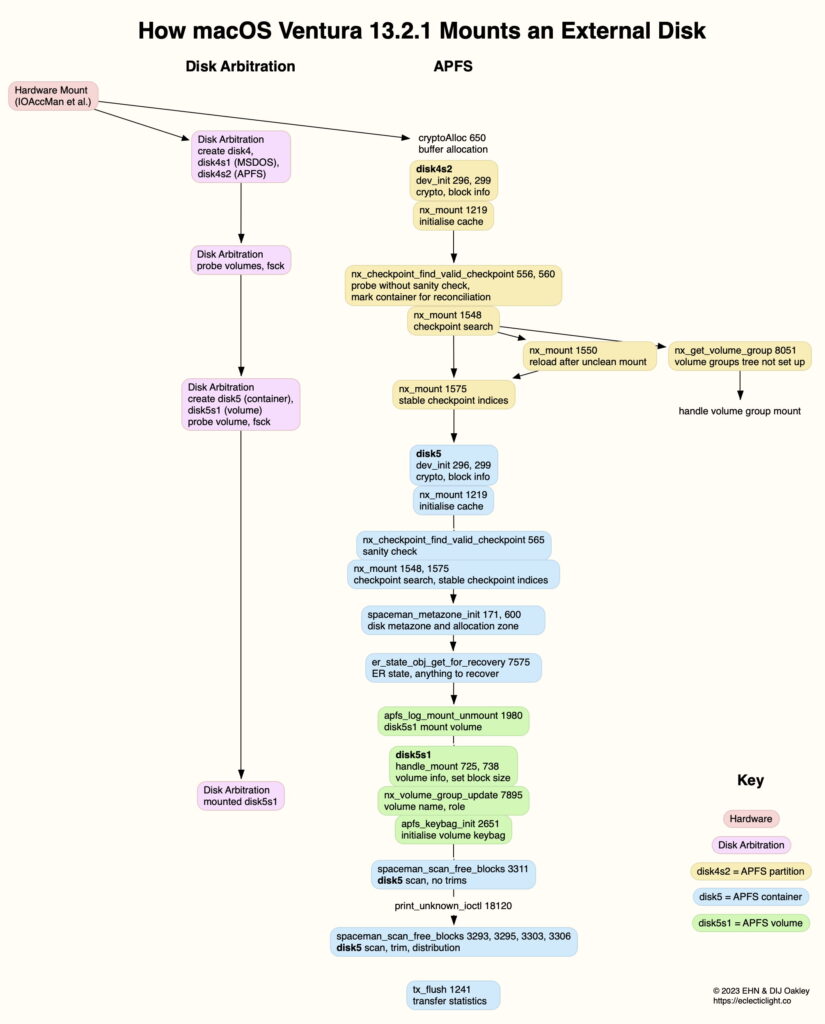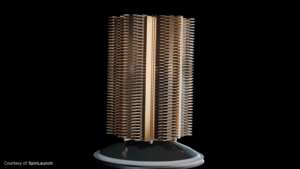APFS: Log entries

One of the only ways to discover what’s going on with APFS is to browse the log. Compared to most other processes and subsystems, its entries are brief, to the point, and worth reading closely. This article provides a guide to help you identify and understand log entries made by APFS in recent versions of macOS, particularly Ventura and Sonoma.
You’ll find log entries from APFS with the following key fields:
processImagePath kernel
senderImagePath apfs
eventMessage, such as apfs_vfsop_unmount:3580: all done. going home. (numMountedAPFSVolumes 55)
There is no APFS sub-system used in log entries.
Predicates and reading
To obtain APFS entries, use a predicate of
senderImagePath CONTAINS[c] “apfs”
Relevant information is also contained in related entries obtained with the following predicate terms:
subsystem CONTAINS[c] “com.apple.diskmanagement”
subsystem CONTAINS[c] “com.apple.mobileaccessoryupdater”
subsystem CONTAINS[c] “com.apple.DiskArbitration.diskarbitrationd”
senderImagePath CONTAINS[c] “IOAccessoryManager”
These are readily available in custom log excerpts in Mints.
The message field of each log entry made by APFS has a standard structure:
The descriptive name of the APFS task, which might refer to a code procedure, e.g. nx_get_volume_group. Note that names prefixed with nx normally refer to the container layer, in accordance with the structures listed in the APFS Reference, although the j prefix isn’t used for the volume layer in the log.
The task-specific identity number, e.g. 8051 for nx_get_volume_group. Some tasks can have more than one ID, and numbers may change with different versions of APFS.
A description of the activity and any results.
Log entries by ID numbers
The following identity numbers appear well-used in recent versions of macOS. Listed in approximate numeric order they include:
Space Manager metazone initialisation, spaceman_metazone_init: 110, 171, 600
rename snapshot for removal, fs_insert_snapshot_metadata: 249
crypto, block info, dev_init: 296
device_handle block details, dev_init: 299
container probe and check, nx_checkpoint_find_valid_checkpoint: 556, 560, 565
crypto buffer allocation, cryptoAlloc: 650
adds fresh mounted snapshot, nx_volume_group_update: 704
mount volume info, handle_mount: 725
mount volume set block size, handle_mount: 738
handle snapshot mount, handle_mount: 817
snapshot mount, handle_snapshot_mount: 996, 1144
volume unmounting, stop background work, apfs_stop_bg_work: 831
deleting snapshot, apfs_snap_vnop_remove: 1052, 1107
initialise cache for mount, nx_mount: 1219, 1224
transfer statistics, tx_flush: 1241
adjust copy-on-write exempt count, apfs_update_cow_exempt_file_count: 1310
object map cleanup, omap_cleanup: 1544
container checkpoint search, nx_mount: 1548, 1550, 1553, 1575, 1580
snapshot deletion, cleanup_snapshot_purgatory: 1805, 1808, 1826
vnode_close() for container unload, container_unload: 1884
unmount volume, apfs_log_mount_unmount: 1980
initialise volume keybag, apfs_keybag_init: 2651
snapshot merges, delete_clone_fs: 2778, 2915
wait for purgatory cleaner to finish, apfs_vfsop_unmount: 2915
volume name, apfs_log_op_with_proc: 3091
unmount completion, apfs_vfsop_unmount: 3244, 3257
Space Manager trim operations, spaceman_scan_free_blocks: 3293, 3295, 3303, 3306, 3311
unwrap volume key, apfs_keybag_unlock_record_tag: 3322
unwrap volume key, apfs_keybag_unlock_record: 3403
snapshot deletion, apfs_vfsop_unmount: 3501, 3567, 3580
bitmap update, gbitmap_update_thread_terminate: 6110
anything to recover, er_state_obj_get_for_recovery: 7556, 7575
volume name and group role, nx_volume_group_update: 7895
buffer I/O only not raw disk access, bufatr_get_apfs: 8040
volume group tree, nx_get_volume_group: 8051
no-effaceable-storage, effaceable_is_disabled: 10727
purge files, handle_purge_files: 10874
print_unknown_ioctl: 18120
unwrap metadata crypto state, apfs_mount: 28950
file system won’t be encrypted, apfs_newfs: 30416
Log entry types listed by theme
Containers:
container probe and check, nx_checkpoint_find_valid_checkpoint: 556, 560, 565
initialise cache for mount, nx_mount: 1219, 1224
container checkpoint search, nx_mount: 1548, 1550, 1553, 1575, 1580
vnode_close() for container unload, container_unload: 1884
volume name and group role, nx_volume_group_update: 7895
volume group tree, nx_get_volume_group: 8051
Volumes:
mount volume info, handle_mount: 725
mount volume set block size, handle_mount: 738
volume unmounting, stop background work, apfs_stop_bg_work: 831
unmount volume, apfs_log_mount_unmount: 1980
wait for purgatory cleaner to finish, apfs_vfsop_unmount: 2915
volume name, apfs_log_op_with_proc: 3091
unmount completion, apfs_vfsop_unmount: 3244, 3257
buffer I/O only not raw disk access, bufatr_get_apfs: 8040
Snapshots:
rename snapshot for removal, fs_insert_snapshot_metadata: 249
adds fresh mounted snapshot, nx_volume_group_update: 704
handle snapshot mount, handle_mount: 817
snapshot mount, handle_snapshot_mount: 996, 1144
deleting snapshot, apfs_snap_vnop_remove: 1052, 1107
snapshot deletion, cleanup_snapshot_purgatory: 1805, 1808, 1826
snapshot merges, delete_clone_fs: 2778, 2915
snapshot deletion, apfs_vfsop_unmount: 3501, 3567, 3580
Space Manager:
Space Manager metazone initialisation, spaceman_metazone_init: 110, 171, 600
Space Manager trim operations, spaceman_scan_free_blocks: 3293, 3295, 3303, 3306, 3311
Encryption:
crypto, block info, dev_init: 296
crypto buffer allocation, cryptoAlloc: 650
initialise volume keybag, apfs_keybag_init: 2651
unwrap volume key, apfs_keybag_unlock_record_tag: 3322
unwrap volume key, apfs_keybag_unlock_record: 3403
no-effaceable-storage, effaceable_is_disabled: 10727
unwrap metadata crypto state, apfs_mount: 28950
file system won’t be encrypted, apfs_newfs: 30416
Example log sequences
Mounting a plain SSD formatted with a single APFS container and unencrypted volume.
Mounting a single APFS (Encrypted) volume on an external Thunderbolt 3 SSD.
Mounting a snapshot on a Time Machine backup store on an external disk.
Performing a clean unmount of an APFS volume.
Articles in this series
1. Files and clones
2. Directories and names
3. Containers and volumes
4. Snapshots
5. Encryption and sealing
6. Special file types
7. Command tools
8. Beyond, to vfs and volfs
References
Apple’s APFS Reference (PDF), last revised 22 June 2020.



